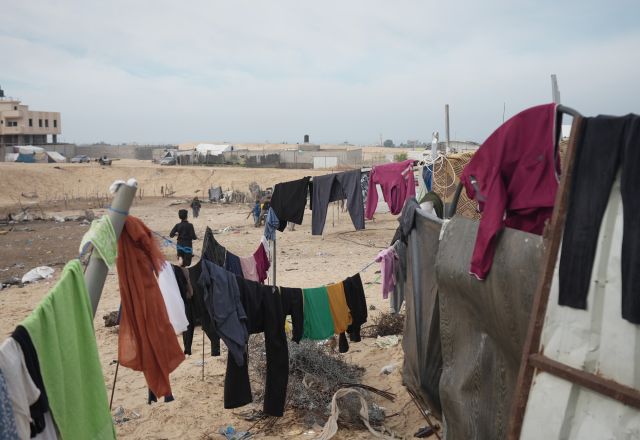
- 6 mins read time
- Published: 16th October 2024
Occupied Territories Bill: Where Do We Stand?
What is the Occupied Territories Bill?
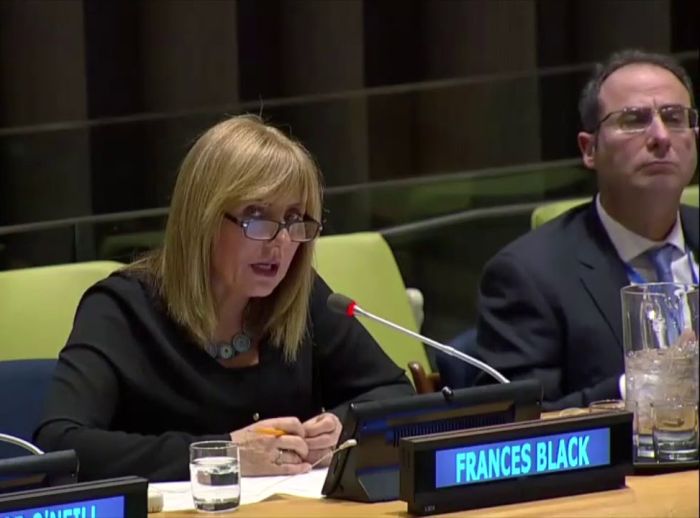
The Occupied Territories Bill in Ireland is a critical piece of proposed legislation first introduced by Senator Frances Black in 2018. The bill aims to ban trade between Ireland and Israel’s occupied territories and illegal settlements, including importing goods and services.
In its advisory opinion, the International Court of Justice (ICJ) concluded that Israel’s continued presence in the Occupied Palestinian Territory is unlawful and that it is under an obligation to bring to an end its unlawful presence “as rapidly as possible.”
Israel is also “under an obligation to cease immediately all new settlement activities and to evacuate all settlers from the Occupied Palestinian Territory,” the opinion continued. As well as this, there should be “reparation for the damage caused to all natural or legal persons concerned.”
The Bill would make Ireland the first EU country to ban the import and sale of goods produced in illegal Israeli settlements, which violate international law, specifically the Fourth Geneva Convention. Many experts argue that economic pressure can push countries to stop the slow and steady growth of Israeli illegal settlements in a constant land grab.
The Bill is regarded as a concrete, meaningful action Ireland could take in response to the unstopped, illegal stealing of the West Bank, including East Jerusalem.
Why has there been a renewed push for its passing?
The ICJ (the UN’s top court) ruled in July that Israeli settlements in the West Bank and East Jerusalem are in breach of international law. Israel’s occupation of those territories amounts to long-term annexation - which has undermined the right of the Palestinian people to self-determination.
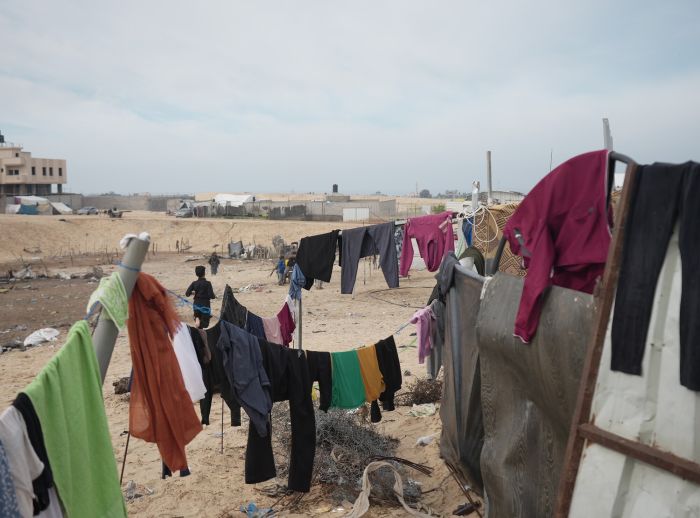
The momentum has been gaining in terms of pressuring the Irish government to pass the Bill, which has been blocked by Fine Gael in Dáil Éireann. It parallels with the increasing recognition of Israel's apartheid system, as labelled by numerous human rights organisations. The economic activity in Israel’s illegal settlements is a key enabler of continued occupation and displacement of Palestinians.
The Irish public has made their stance clear on their support for passing the Bill, and imposing sanctions on Israel.
What has Oxfam Ireland said about the Occupied Territories Bill?
Bríd McGrath, head of Public Affairs at Oxfam Ireland, said the following when fresh legal advice was shared to the International Court of Justice on August 4th:
"Oxfam Ireland urge the Irish Government to seriously take into account the legal advice published today and quickly reassess its stance on the Occupied Territories Bill - the time for action is now.”
"Irish people want to know our hands are clean in this conflict. We don't want to be complicit in any way with illegal Israeli occupation. We stand beside the Palestinian people who have suffered long enough."
— Bríd McGrath, head of Public Affairs at Oxfam Ireland.
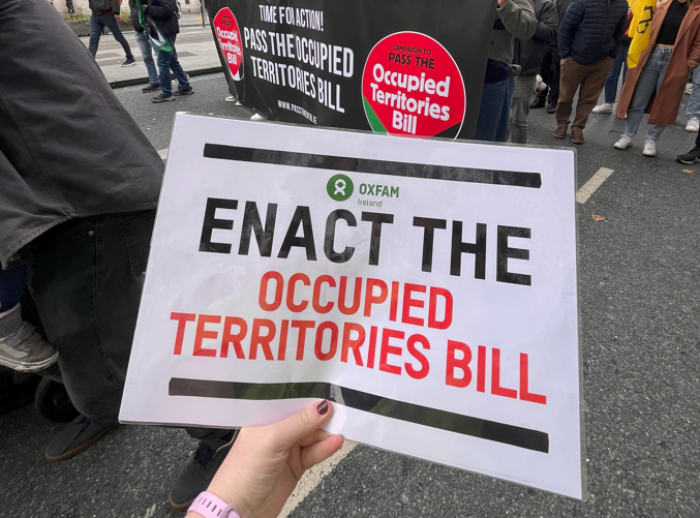
Oxfam have also joined a collective of groups - Christian Aid, Trócaire, trade unions and politicians - which make up the Pass the Occupied Territories Bill campaign.
What role does the Attorney General have in terms of passing the OTB?
The Attorney General has a crucial role in this Bill in particular, as previous advice given to former Governments have been used as reason not to pass the Bill by Fine Gael.
Critics of the Bill, including the Irish government, have raised concerns about potential clashes with EU trade law, but the International Court of Justice ruling has compelled the Irish State to take on board fresh legal advice from AG, Rossa Fanning.
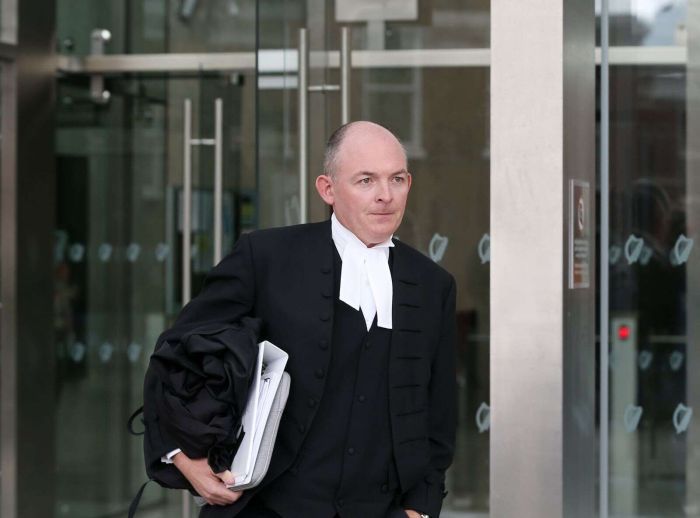
Rossa Fanning will take into consideration a legal opinion written by Professor Takis Tridimas, who worked as a legal adviser in the European Commission and Parliament, and Professor Panos Koutrakos who is a leading academic on EU law. Both academics argued the Occupied Territories Bill is not at odds with EU law because member states can deviate from directives in order to protect the fundamental rights of the union.
If the Attorney General gives legal clearance, the Government would draft its own Occupied Territories Bill, which would be introduced in the Dáil.
What has the current Government said about Rossa Fanning’s legal advice?
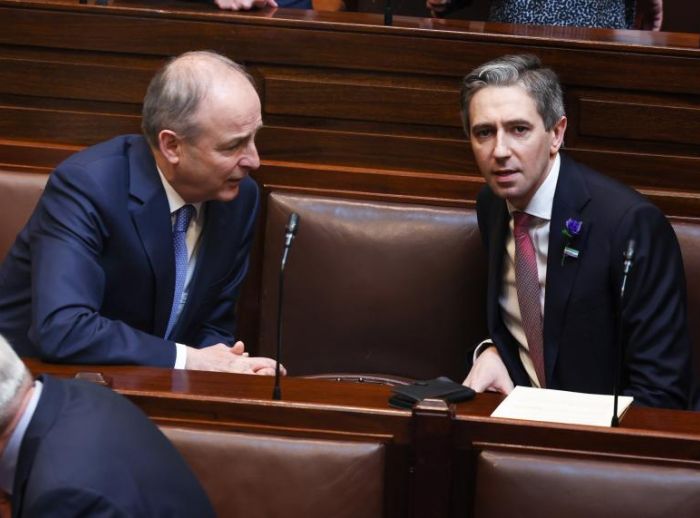
"If there's more Ireland can do, Ireland will absolutely not be found wanting, and I'd be willing to work with people across the political divide in relation to this," Taoiseach Simon Harris said on October 15th. I would like this current Government to make progress on this.”
Tánaiste Mícheál Martin said his department will prepare a memorandum in relation to a path forward for the bill during the week of 21 October.
"The context of the International Court's advisory opinion has changed the situation in so far as it puts obligations on Member States not to do anything that would support the illegal occupation of Palestine,” Minister Martin said. “There are still challenges and the existing bill would need to be redrafted and amended very substantively given the advice we have received.”
What is holding the Bill back now from being passed?
The General Election can be used as a time constraint for not passing the Bill.
However, it is unlikely (though not impossible) the Coalition would have time before the General Election to draft a Bill and have it pass through the Houses of the Oireachtas. Fianna Fáil and the Green Party committed to passing the Occupied Territories Bill before in their 2020 General Election manifestos.
What impact would passing the OTB have?

Economically, it would only impact around €1 million in trade. Speaking with RTÉ, Senator Frances Black said:
“It’s not going to end the occupation on its own.”
“It’s about saying that Ireland will no longer support this horrific injustice that’s happening. I hope it will be passed very quickly in whatever new government is going to be formed in the new year or whenever that is.”
Getting the Bill past the Committee Stage and into the Report stage of the Dáil where it has been stuck for years would be considered a win for the #PassTheOTB campaign.
Financially, it won’t impact a massive amount of money. However, the cultural and political impact would be significant, and could open the door to other countries to pass similar laws which would have a greater financial impact on Israel.




